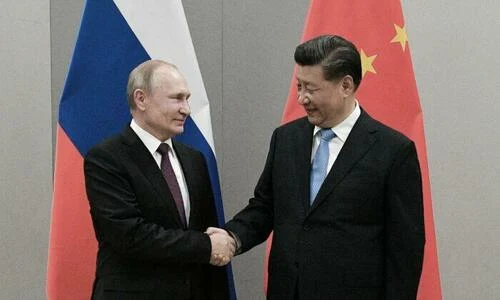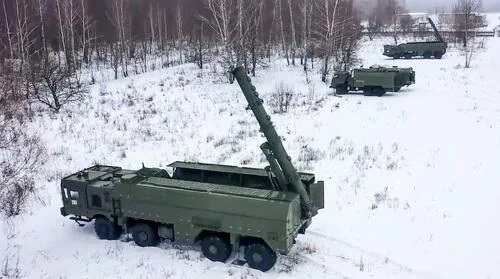Tensions are mounting throughout the world concerning the possibility of a war between Russia and Ukraine. One question that has experts on edge is what role China might play in such a conflict, and how such an event could set a dangerous precedent for China’s global ambitions—particularly in relation to Taiwan.
Russia has demanded that Ukraine never be allowed to join NATO. As of this week, it has amassed 130,000 troops at the eastern border of Ukraine to intimidate Western nations into disallowing Ukraine from ever joining the alliance and to pressure the global community away from further militarizing the region.
The Chinese leadership has joined in the effort, urging cool heads while also giving cover for Russia and its history of illegal expansion.
The regime’s Foreign Minister Wang Yi and U.S. Secretary of State Antony Blinken spoke about the situation during a telephone call on Jan. 27. Wang used the call to tell Blinken to “stay calm” and warned the United States to stop creating “anti-China cliques.”
The interaction could signal a much-increased role for China as a diplomatic go-between for Russia and the rest of the world.
A Different World than 2014
Despite the temptation to compare the current crisis to Russia’s illegal annexation of Crimea from Ukraine in 2014, experts say that the geopolitical and economic landscape is quite different in 2022.
Perhaps the most notable difference, they say, is that China will play a prominent, if not dominant, role in any potential conflict and its eventual resolution.
This state of affairs is in stark contrast to 2014 when, given the chance to support Russia’s claims to Crimea, the Chinese regime’s leadership demurred.
“China did not recognize the 2014 Russian annexation of Crimea because it did not want to get implicated,” said Sam Kessler, a geopolitical analyst at North Star Support Group, a multinational risk management firm. “They didn’t condemn it either, which is important to know.”
“The Chinese delegation abstained twice when initiatives to officially condemn the [annexation] were introduced at the United Nations,” Kessler added.
There were multiple reasons for declining to recognize the Crimean Peninsula as Russian territory at the time, according to Giselle Jamison, associate professor of political science and international relations at St. Thomas University.
In the first, it interfered with plans for a deep-water port in Ukraine that China had invested in, Jamison told EpochTV’s “China Insider” program. In the second, China did not have the depth of economic ties with Russia that it has now.
In fact, the increasing interconnectedness of the Chinese and Russian economic spheres owes largely to the 2014 annexation, which Kessler said changed nearly everything about the U.S.-China-Russia trilateral relationship and its balance of power.
“The sanctions imposed in 2014 enabled Moscow to abandon most of their Western economic interests and pivot to China and the rest of Asia,” Kessler said.
“This has streamlined significant economic, security, defense, political, and good neighbor agreements that previously had either been stalled or gradual processes.”
This interconnectedness means that China stands to lose much more to sanctions on Russia in 2022 than in 2014.
The potential knock-on effects of Russian sanctions on Chinese markets may thus necessitate that China’s communist leadership will engage heavily in the Ukraine crisis.
“A conflict between Russia and Ukraine would force Beijing to take a more solid stance than they did in 2014,” Kessler said.
“The current circumstances and diplomatic environment are more evolved and strained between all parties involved than they were in 2014. It would impact China both politically and economically because their strategic positioning is now more direct and transparent than it had been.”
Kessler’s comments were in line with the findings of a recent report on the issue by Christopher Miller, an assistant professor of international history at Tufts University, and co-director of the school’s Russia and Eurasia program.
“Because China is deeply intertwined with Russia in terms of trade and, to a lesser extent, finance, it would be unable to sit on the sidelines,” Miller wrote. “Beijing would either have to reject US sanctions and export controls, help enforce them, or do some mix of both.”
“Either way, China would be forced to choose.”
China is Key to Russian Success, or Failure
That power over the effectiveness of U.S. economic coercion methods is new territory for China and means that Beijing could make or break any attempt by the United States to punish Russia for its actions.
There are two key reasons, according to analysts, that indicate that Beijing would not support Western sanctions on Russia. The first is that its dependence on international trade with Russia has grown. The second is that its leadership is not incentivized to promote U.S. goals or ways of doing business.
Concerning the first, Russia currently imports and exports more goods with China than any other nation. Sanctions would majorly disrupt China’s state-owned firms and Russian-based corporations.
Specifically, Miller’s report warns that commodity markets for aluminum, nickel, copper, and palladium could be significantly disrupted, leading to price hikes which would further compound supply chain woes for critical technologies, to say nothing of energy supplies and other sectors.
Likewise, enforcing such measures would require China to go against its longstanding dedication to national sovereignty, by serving as an enforcer of the United States’ vision for a liberal international order, which is unlikely.
There is also a tertiary problem for Chinese Communist Party (CCP) leaders, according to Jamison, which is pride. Pride that would prevent the regime from promoting export controls that could be used to imply that China somehow needs U.S. permission to trade with whomever it wishes.
“This time, if the West carries through on its most severe threats, the impact on China could be profound, in terms of economics, but also in terms of reputation,” Miller wrote. “If China adheres to US sanctions against Russia, Beijing’s economic heft will seem less significant and America’s financial power will be enhanced,” Miller wrote.
“This raises the stakes for Beijing, which in a crisis might conclude it has no choice but to stand up to America’s extraterritorial sanction power. If so, Russia would find a valuable friend amid the crisis—and the West could find itself embroiled in a two-front financial war.”
China Signaling Support for Russia
The Chinese regime, in fact, may gain influence if the United States attempts to leverage heavier sanctions on Russia, analysts note. This is due in no small part to the fact that Beijing has made leveraging loans a strategic priority for garnering influence worldwide.
If the United States sanctioned Russia, China could offer loans to cover the lost revenues, thereby simultaneously helping Russia to evade the heft of the sanctions while also increasing its own economic sway over Russia.
“China is very likely to not obey any Western sanctions that would be imposed on Russia since they already firmly opposed the ones placed on Iran,” Kessler said.
“If the West imposed more export controls and sanctions on Russia, then China could find ways to violate them while imposing blame on the West for having caused it,” Kessler added.
To that end, Chinese state-run media has already broken with the precedent of 2014, and suggested support for Russia. The Global Times, a hawkish CCP-controlled outlet, tweeted an editorial that said the crisis stemmed from NATO cannibalizing Russia’s strategic space.
In recent times, as the United States and its allies have taken an increasingly tough stance towards Beijing’s malign activities, China and Russia have grown closer. Putin is expected to visit China in February, and the two nations have implemented joint military drills on an unprecedented scale over the last year.
While China is key to Russian success, however, its communist leadership is not as altruistic as Russia might like to believe. And China’s slow shift into the leading role in the Sino-Russian relationship could carry its own price to pay for Russia.
“Chinese philosophy and politics, in my opinion, is a lot more long term and, in a way, [more] clever, than the abrupt nature of Putin,” Jamison said.
While Beijing is unlikely to directly aid in a conflict between Russia and Ukraine, Jamison said, it would help Russia sidestep any punishments, and carefully calculate the United States’ response.
“China is watching,” Jamison said.
Ukraine: A Precedent for War with Taiwan?
The Russia-Ukraine crisis is something of a litmus test, then, for the viability of an alternative framework to the U.S.-led international order. It is an opportunity for CCP leadership to measure the effectiveness of authoritarian governance as a counter vision to the liberal-democratic ideals enshrined by the U.S.-led rules-based international order.
According to Miller, China will use the crisis in Ukraine to gauge the effectiveness of the United States in responding to regional issues throughout Eurasia, and determine what the corollary responses should be.
“The success or failure of U.S. efforts to impose meaningful costs on Russia if it escalates will be seen as a test of whether the U.S. could do something similar in Asia … Because of this, China will not see a new phase of war between Russia and Ukraine as a peripheral issue in its foreign policy, even though China has no core issues at stake in Ukraine itself,” Miller wrote.
In this way, Kessler said, China’s observations of the Ukraine crisis will inform how it proceeds in its ambition to unite Taiwan with the mainland.
“Russia and China are very likely engaged in observing every little move the West is making and testing them to see how it responds,” Kessler said.
“This will greatly impact China’s future decisions regarding Taiwan, especially since Xi Jinping is facing reelection,” he added, referring to the Chinese leader’s bid for an unprecedented third term in power to be determined at a twice-in-a-decade Communist Party Congress to be held this autumn.
China’s ambassador to the United States, Qin Gang, in an unusually direct statement, said in an interview on Jan. 27 that the United States would face “military conflict” over Taiwan if the island’s democratic government continued to seek independence from the regime’s communist government.
According to Kessler, what lessons the CCP ultimately derives from U.S. efforts to sanction Russia could have profound implications for the continued success of the United States in the Indo-Pacific and abroad, as CCP officials consider the ongoing tensions to a test of American power itself.
“Other than Ukraine, this could lead to future military and economic decisions relating to Taiwan as well,” Kessler said.
“The endgame for Russia and China is to very likely figure out the potency of Western commitment and resolve.”
David Zhang contributed to this report.
Authored by Andrew Thornbrooke via The Epoch Times (emphasis ours),


